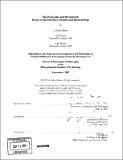The particular and the general : essays at the interface of ethics and epistemology
Author(s)
Berker, A. Selim
DownloadFull printable version (9.522Mb)
Alternative title
Essays at the interface of ethics and epistemology
Other Contributors
Massachusetts Institute of Technology. Dept. of Linguistics and Philosophy.
Advisor
Judith Jarvis Thomson.
Terms of use
Metadata
Show full item recordAbstract
This dissertation consists of three chapters exploring the nature of normativity in ethics and epistemology, with an emphasis on insights that can be gleaned by comparing and contrasting debates within those two fields. In chapter 1, I consider particularism, a relatively recent view which holds that, because reasons for action and belief are irreducibly context-dependent, the traditional quest for a general theory of what one ought to do or believe is doomed for failure. In making these claims, particularists assume a general framework according to which reasons are the ground floor normative units undergirding all other normative relations. However, I argue that the claims particularists make about the behavior of reasons undermines the very framework within which they make those claims, thus leaving them without a coherent notion of a reason for action or belief. Chapter 2 concerns a problem arising for certain theories that take the opposite extreme of particularism and posit a fully general theory of what one ought to believe or do. In the epistemic realm, one such theory is process reliabilism. A well-known difficulty for process reliabilism is the generality problem: the problem of determining how broadly or narrowly to individuate the process by which a given belief is formed. Interestingly, an exactly parallel problem faces one of the most dominant contemporary ethical theories, namely Kantianism. I show how, despite their seeming differences, process reliabilism and Kantianism possess a markedly similar structure, and then use this similarity in structure to assess the prospects that each has of ever solving its version of the generality problem. (cont.) Finally, in chapter 3, I consider a recent argument by Timothy Williamson that what it would be rational for one to do or believe is not luminous, in the following sense: it can be rational for one to do or believe something, without one's being in a position to know that it is. Careful attention to the details of Williamson's argument reveals that he can only establish this limit to our knowledge by taking for granted certain controversial claims about the limits of belief.
Description
Thesis (Ph. D.)--Massachusetts Institute of Technology, Dept. of Linguistics and Philosophy, 2007. Includes bibliographical references (p. 133-138).
Date issued
2007Department
Massachusetts Institute of Technology. Department of Linguistics and PhilosophyPublisher
Massachusetts Institute of Technology
Keywords
Linguistics and Philosophy.